
The Prime Minister of Ukraine is the head of government of Ukraine. The prime minister presides over the Cabinet of Ministers of Ukraine, which is the highest body of the executive branch of the Ukrainian government. The position replaced the Soviet post of chairman of the Council of Ministers of the Ukrainian SSR, which was established on March 25, 1946.
The All-Ukrainian Union "Fatherland", referred to as Batkivshchyna, is a political party in Ukraine led by People's Deputy of Ukraine, former Ukrainian Prime Minister Yulia Tymoshenko. As the core party of the former Yulia Tymoshenko Bloc, Batkivshchyna has been represented in the Verkhovna Rada since Yulia Tymoshenko set up the parliamentary faction of the same name in March 1999. After the November 2011 banning of the participation of blocs of political parties in parliamentary elections, Batkivshchyna became a major force in Ukrainian politics independently.
European Solidarity is a political party in Ukraine. It has its roots in a parliamentary group called Solidarity dating from 2000 and has existed since in various forms as a political outlet for Petro Poroshenko. The party with its then name Petro Poroshenko Bloc won 132 of the 423 contested seats in the 2014 Ukrainian parliamentary election, more than any other party.

Arseniy Petrovych Yatsenyuk is a Ukrainian politician, economist and lawyer who served as Prime Minister of Ukraine from 27 February 2014 to 14 April 2016.
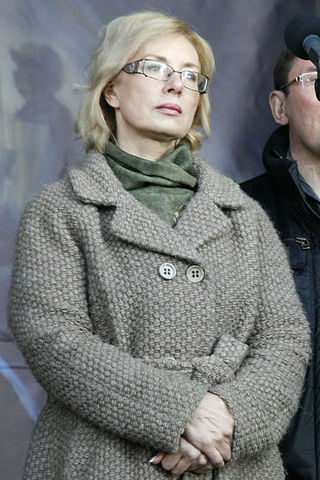
Lyudmyla Leontiyivna Denisova is a Ukrainian politician. After twice serving as Minister of Social Policy of Ukraine, Denisova worked as Ombudsman for Human Rights in Ukraine from March 2018 to May 2022.

Parliamentary elections were held in Ukraine on 28 October 2012. Because of various reasons, including the "impossibility of announcing election results" various by-elections have taken place since. Hence, several constituencies have been left unrepresented at various times.

A People's Deputy of Ukraine is a member of parliament and legislator elected by a popular vote to the Verkhovna Rada. People's Deputies of Ukraine are often referred to simply as the "deputies"; however, regular deputies are members of regional and local councils, while people's deputies are elected to the national parliament, Verkhovna Rada. Prior to 1991, the Verkhovna Rada was named the Supreme Council of People's Deputies of the Ukrainian Soviet Socialist Republic.

The second Azarov government was the government of Ukraine from 24 December 2012 to 28 January 2014. It was dissolved amidst the Euromaidan protests. The ministers (except Prime Minister Mykola Azarov who was replaced by Deputy Prime Minister Serhiy Arbuzov, continued briefly as a caretaker government. On 27 February 2014 Ukraine's parliament approved a resolution to formally dismiss the government.
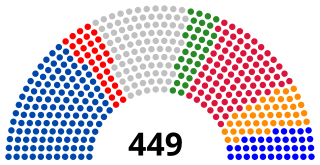
The 7th Ukrainian Verkhovna Rada was a session of the legislative branch of the Verkhovna Rada, Ukraine's parliament. Its composition was based on the results of the 2012 parliamentary election. Half of the seats in the parliament were apportioned between the five winning parties based on the popular vote, while the other half was apportioned between 4 parties and 44 independents between 225 constituencies throughout the country. It first met in the capital Kyiv on December 12, 2012, and ended its session on November 27, 2014, after the 8th Verkhovna Rada began its first session.
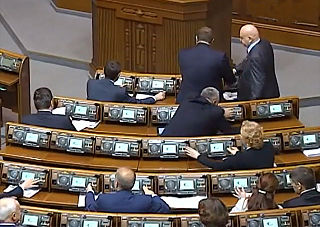
A button pusher is a term in Ukrainian politics and society related to a member of the Verkhovna Rada of Ukraine who votes on a motion by using their own identity card as well as ones belonging to other deputies.

Volodymyr Borysovych Groysman, sometimes Hroisman, is a Ukrainian politician who was the Prime Minister of Ukraine from 14 April 2016 to 29 August 2019.
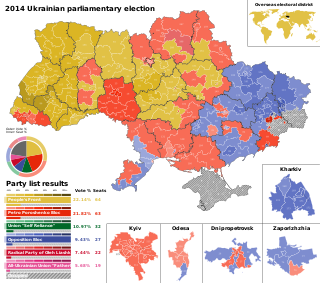
Snap parliamentary elections were held in Ukraine on 26 October 2014 to elect members of the Verkhovna Rada. President Petro Poroshenko had pressed for early parliamentary elections since his victory in the presidential elections in May. The July breakup of the ruling coalition gave him the right to dissolve the parliament, so on 25 August 2014 he announced the early election.
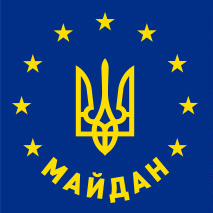
The Maidan People's Union is an alliance in Ukraine formed by several political parties and non-partisan individuals and public organizations on the fifth Sunday of the Euromaidan-protests with the aim of "building a new Ukraine and a new Ukrainian government" by creating a new Ukrainian constitution, and removing corrupt judges and prosecutors. It also aims to organize opposition to the current regime and to coordinate the protest movement in all regions of the country. In practice this means broadening support for the goals of the organization in the pro-government and pro-presidential heartland East Ukraine.

People's Will, formerly known as Sovereign European Ukraine, was a centrist, pro-Europe Ukrainian parliamentary faction in its national parliament Verkhovna Rada.
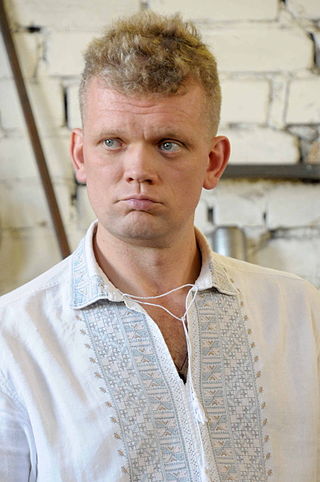
Ihor Oleksandrovych Shvaika is a right-wing Ukrainian politician and a former Minister of Agrarian Policy and Food of Ukraine. Shvaika was elected to the 7th Ukrainian Verkhovna Rada during the 2012 parliamentary election as a member of the All-Ukrainian Union "Freedom" party.

Yevhen Mykolayovych Nyshchuk is Ukrainian theater and cinema actor, Merited Artist of Ukraine and a former Minister of Culture of Ukraine. He held the post from February to December 2014, and again from April 2016 to August 2019.

People's Front is a nationalist and conservative political party in Ukraine founded by Arseniy Yatsenyuk and Oleksandr Turchynov in 2014.

The second Yatsenyuk government was created in Ukraine after the 2014 Ukrainian parliamentary election. On 2 December 2014, 288 members of the Ukrainian parliament approved the composition of the cabinet. The Government was backed by Petro Poroshenko Bloc, People's Front, Self Reliance, Fatherland and Radical Party.

The Verkhovna Rada of Ukraine of the 8th convocation was a convocation of the legislative branch of the Verkhovna Rada, Ukraine's unicameral parliament. The 8th convocation met at the Verkhovna Rada building in Kyiv, having begun its term on 27 November 2014 following the last session of the 7th Verkhovna Rada. Its five-year term came to an end on July 24, 2019, marking the end of its tenth session.

The Groysman government was formed on 14 April 2016, led by Volodymyr Groysman. It was the third Ukrainian cabinet formed since the 2014 Ukrainian revolution, following on from the first and second Yatsenyuk governments.























